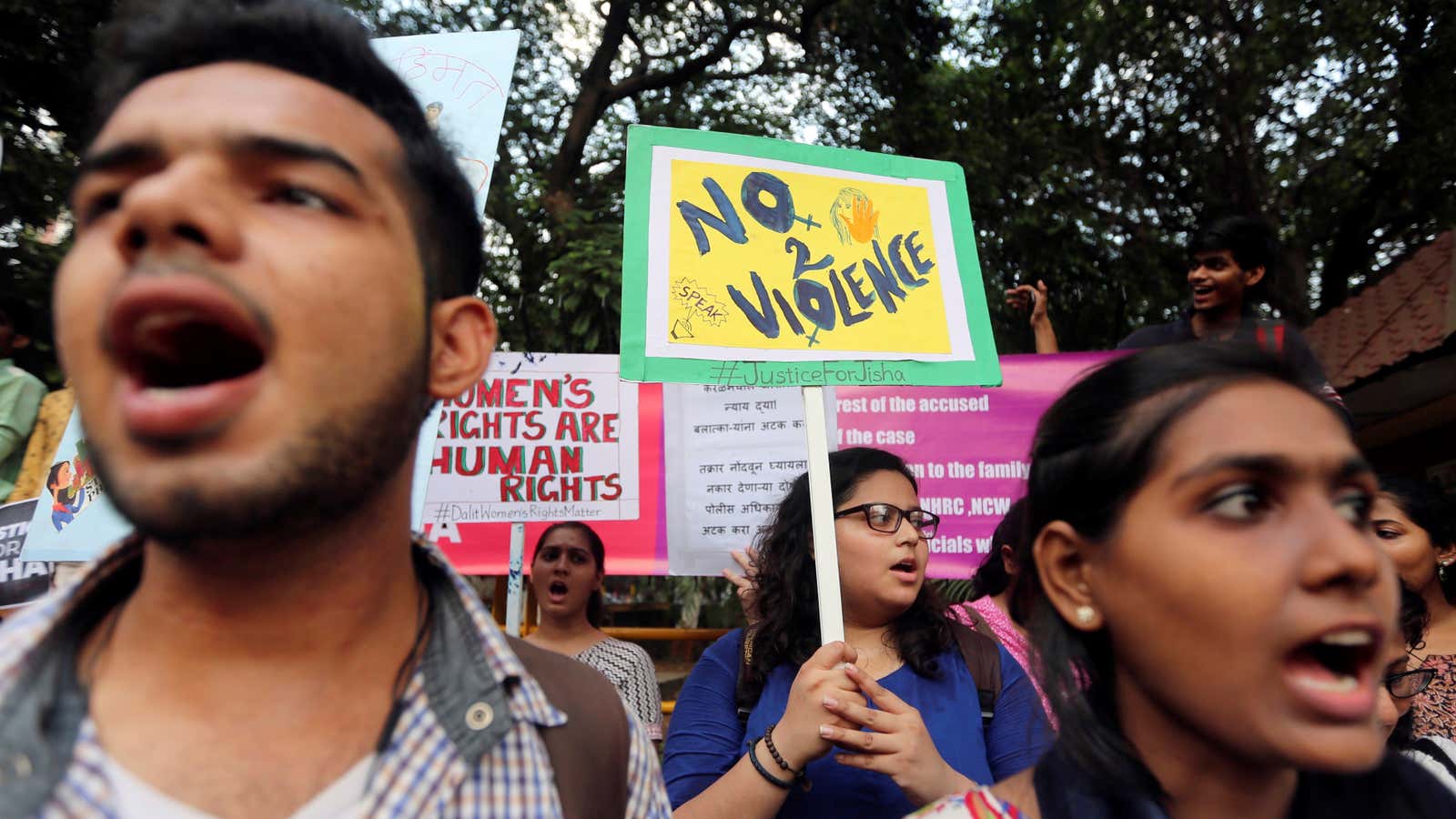This New Year’s Eve, India’s Silicon Valley reared its ugly head. As thousands of revelers gathered in Bengaluru’s city center—MG Road and Brigade Road— to ring in 2017, hooligans infiltrated the celebratory crowd, and for many women, the joyful parade turned into a nightmare.
An unruly mob of men began ”pawing, molesting and passing lewd remarks on women on the streets,” according to the Bangalore Mirror, whose photojournalists were on the ground when havoc broke out minutes before midnight. Women cried for help and ran with heels in hand as men, many inebriated, mauled them. Eyewitnesses described the horrific incident as a “mass molestation.”
The capital city of the southern Indian state Karnataka had reportedly deployed 1,500 policemen to maintain order on the festive night. But with hoards of people out on the streets, and perpetrators mixed among them, the cops were severely outnumbered. “[One of the cops] went and chased them but they were back to the spot in a couple of minutes,” one witness on MG Road told the Bangalore Mirror. ”There was nothing much that they could do.” A day after the heinous incident occurred in the public eye, the police claimed to not have received any complaints of harassment. Nagendra Kumar, the deputy commissioner of police at the Bengaluru command center, told the Bangalore Mirror they took 450 calls on Saturday night “and not even one was about women being assaulted or molested.”
The response from authorities and leaders was underwhelming. Instead of apologizing, Bengaluru home minister G. Parameshwara blamed the police’s failure on the “culture” of New Years celebrations: “A large number of youngsters gathered— youngsters who are almost like westerners…they try to copy westerners not only in mindset, but even the dressing, so some disturbance, some girls are harassed, these kind of things do happen.” Abu Azmi, a leader of the democratic socialist Samajwadi party, said these incidents occur because “women call nudity ‘fashion,'” adding that they would be better off if they stayed home on New Year’s eve.
Bengaluru, India’s IT hub, may house some of the country’s most educated and elite citizens but the latest incident is a stark reminder that women can’t consider even the most metropolitan cities in India a safe haven. In the aftermath of the appalling incident, distraught women took to social media.
In response, the custodians of men’s rights came to the fore, abdicating responsibility for the incident with the hashtag #notallmen.
But this isn’t about “the good, decent men. Because enough men out there are bad,” one Twitter user explains. And it avoids acknowledging there are real social issues plaguing India’s daughters.
India’s patriarchal culture has treated women as second-class citizens for centuries. Female babies are often killed—in the womb or after birth–or abandoned in India, leading to one of the world’s most skewed sex ratios: boys outnumber girls in many of the country’s 29 states. For women who escape violence in childhood, early adulthood can be dangerous and even deadly: jilted men sometimes attack women who refuse marriage proposals with acid. Although dowry has been banned in India for more than five decades, the practice is still rampant. Over 7,600 dowry deaths—where women are murdered or driven to suicide by harassment and torture by husbands and in-laws trying to extort further dowry—were reported in the country in 2015, according to the National Crime Records Bureau. And the country still doesn’t have a law against marital rape.
Many Twitter users are arguing that the discourse around the New Year’s tragedy needs to be centered around Indian women, almost all of whom have been at the receiving end of an unwanted brush on the bus, a deliberate shove on the train, or far more severe incidents of sexual assault at some point in their lives.
